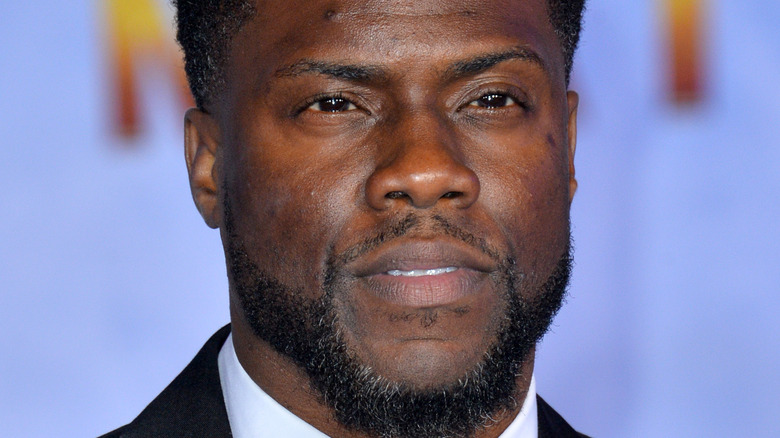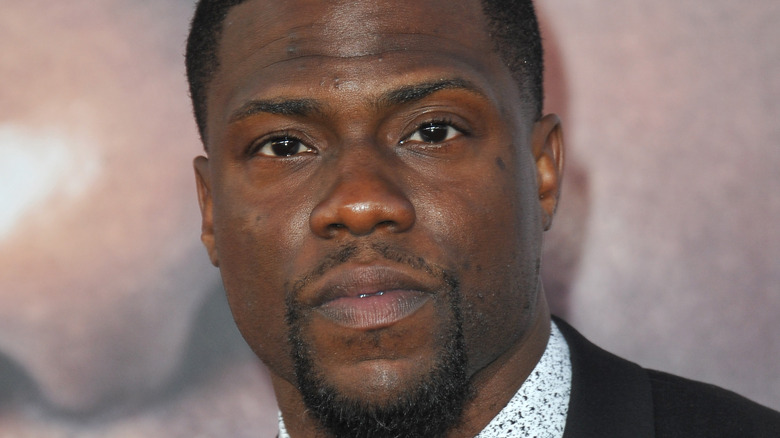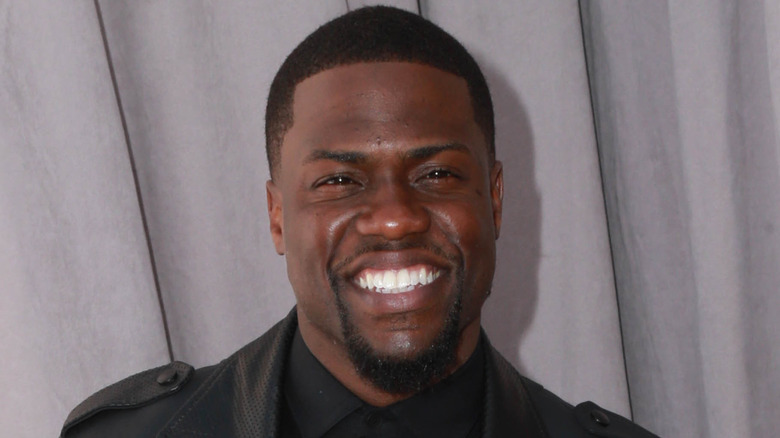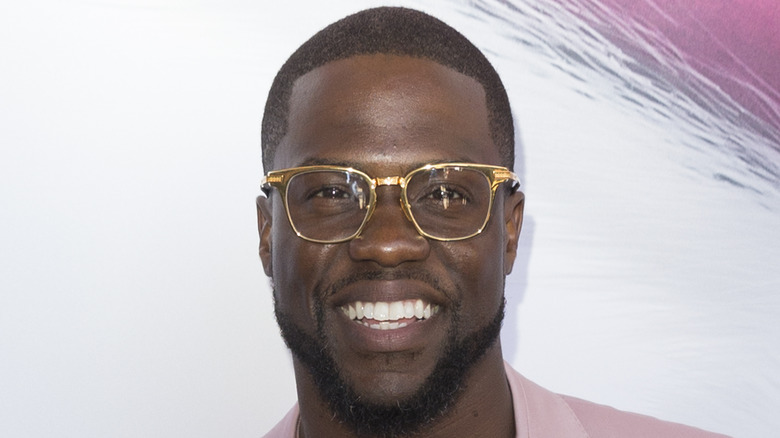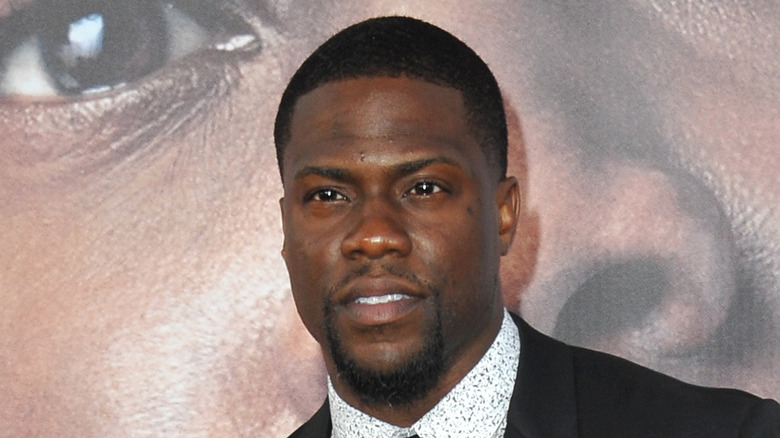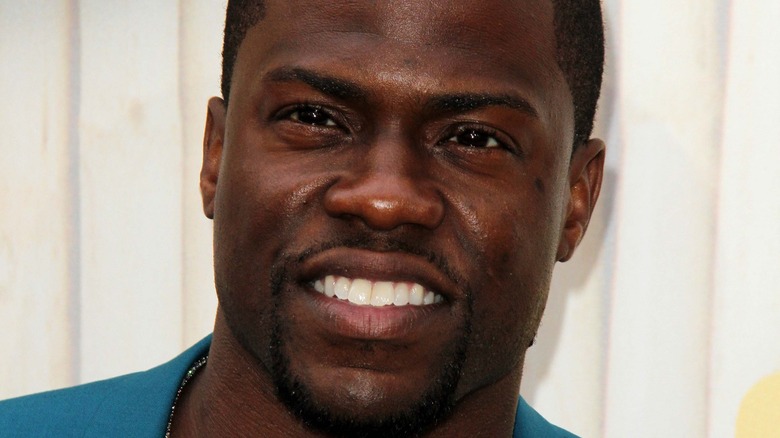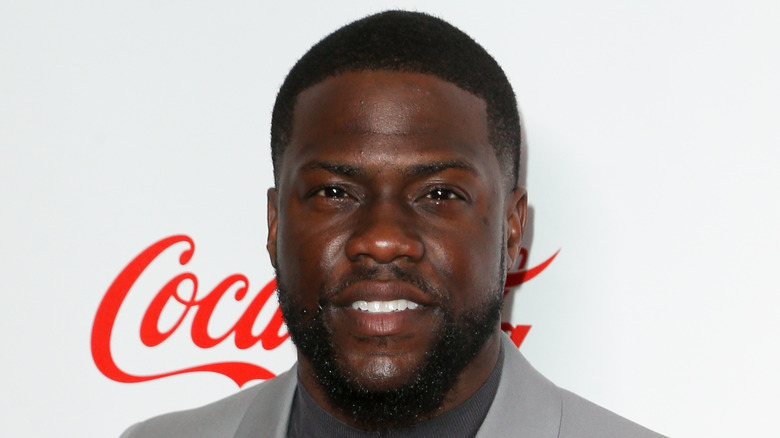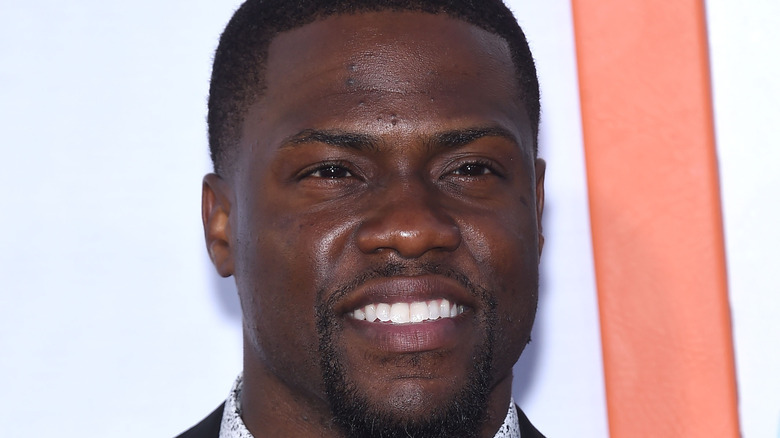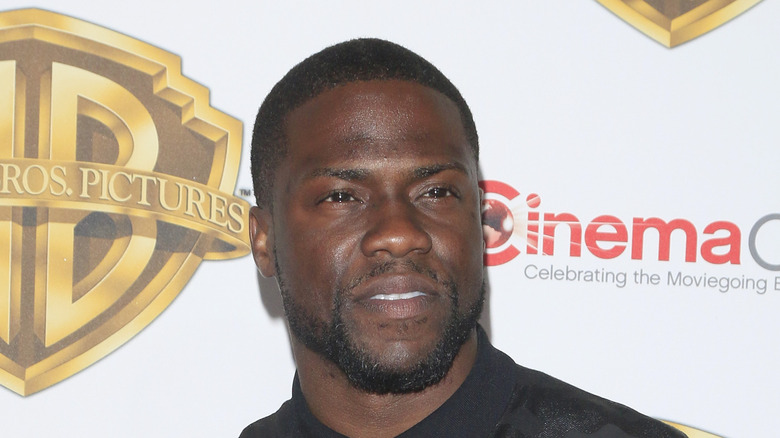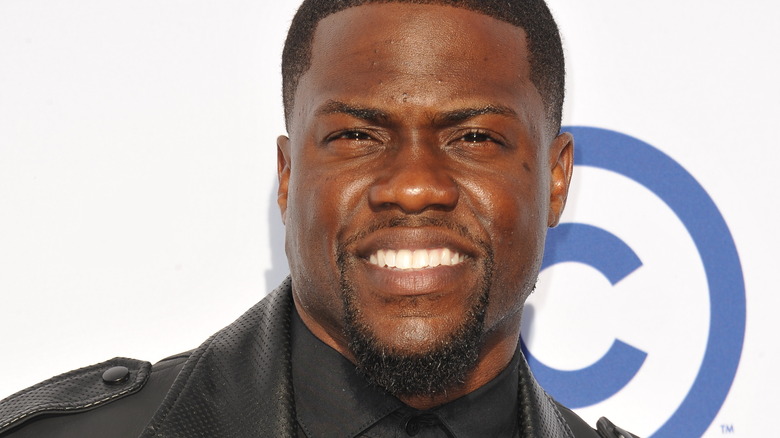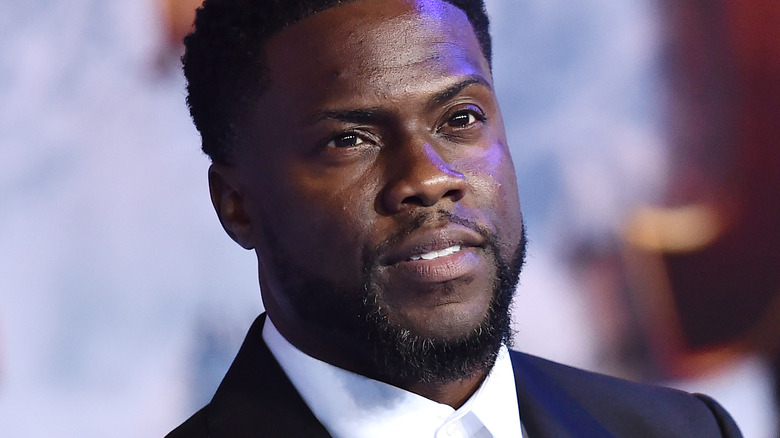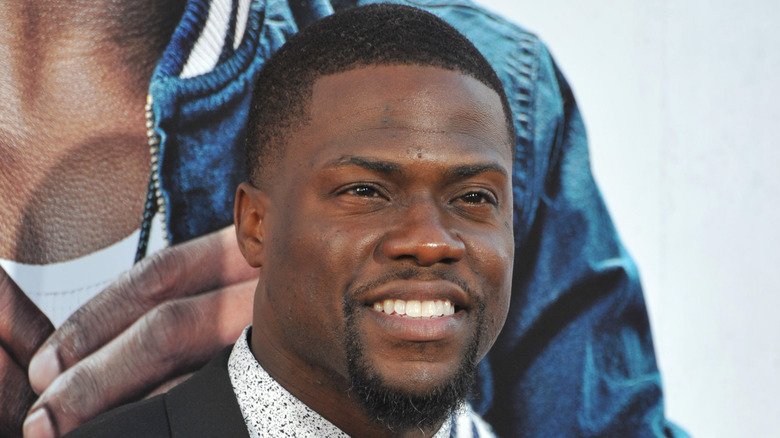How Much Is Kevin Hart Actually Worth?
Before comedian, businessman, and actor Kevin Hart took Hollywood by storm, the Philadelphia native began his career as a struggling comic who couldn't quite find his footing. However, by poking fun at his height and his complicated relationship with his father, Hart was able to set himself apart from other comedians. And clearly, his work has paid off big time: According to Celebrity Net Worth, he's worth $200 million.
The "I Can't Make This Up" author had a tough time adjusting to the millionaire lifestyle at first. Chatting with CNBC Make It about his early financial choices and how much he spent after receiving his first big check, he hilariously recalled not understanding the value of money. "If I had to put a number on it I would say it was stupid plus stupid, which equals stupid, okay," Hart said in the interview. "I don't even feel comfortable talking about it, but in my defense, so many people don't understand the value of money until they have it and no longer have it."
It seems that Hart makes much better financial decisions now, as his successful comedy career and many business ventures made him a fortune. So, how was the comedian able to earn $200 million? Read on to find out the ins and outs of Kevin Hart's net worth.
Kevin Hart had a tough childhood
Kevin Hart had a difficult childhood. Raised in a single-parent household, the star's mother, Nancy Hart, was the sole provider for Kevin and his older brother, Robert Hart. As a result, the family did not have much money. "We come from a f***ed-up situation," Robert told Variety. "We come from the worst living conditions." In an interview with CNBC Make It, Hart described his childhood home as a "little apartment that we had when I was growing up." Although the comedian only shared the apartment with his mother and older brother, there still wasn't much space for the three of them. "We had a hallway, and there was my mom's side and there was me and my brother's side," Hart recalled.
While Kevin's mother was struggling to care for two children, the star's father, Henry Witherspoon, was in and out of prison, per Variety. "He didn't escape any of it — jail, drugs, addictions, ruining your family to a point where my mom didn't want me and my brother to be around him," Kevin told the outlet. Still, the father and son were later to mend their relationship. Witherspoon even has a strong bond with Kevin's children. "He's as good as he can be," the comedian said of his father. "He's very much in their lives. He talks to them. He sends them messages. He FaceTimes. He's serious about making his presence felt."
If you or anyone you know is struggling with addiction issues, help is available. Visit the Substance Abuse and Mental Health Services Administration website or contact SAMHSA's National Helpline at 1-800-662-HELP (4357).
He got a gig selling shoes
One of Kevin Hart's earliest gigs wasn't exactly a typical way to get a foot in the door of the comedy scene — and it wasn't exactly super lucrative. As he shared on "The Howard Stern Show" in 2019, after giving college a try, he began working as a shoe salesman. His mother told him he had "one year to figure it out." It was at this job that the star began pondering the idea of a career in comedy. The problem was that Hart had no idea where to start. In an interview on "The Tony Robbins Podcast," Hart revealed that his co-workers first suggested he do stand-up at Philadelphia comedy clubs.
"When you get dealt certain hands, sometimes you have no idea what the turn is gonna be, and for me ... it was the thought of doing comedy, but I just never knew how," the comedian said. But that small push by his fellow show store employees set the wheels in motion, and the local comedy club shows gave Hart the opportunity to launch his career. "I never knew that these things existed and when I got the opportunity to do that I fell in love with the moment," Hart shared with Robbins.
The comedian struggled at first
It isn't easy to pursue a career in comedy. For starters, the criticism can be brutal, and there is a lot of competition. Though he's one of the biggest names in show business now, Kevin Hart struggled at the beginning of his career, and it took him years to make a decent living doing stand-up. Hart detailed the timeline of his career in an in-depth interview with The New York Times. Before cultivating his own voice as a comic, he "tried too hard to imitate" legendary comedians like Chris Tucker. This didn't go over well with audiences. "I was trying to be everybody," Hart said of his early days in comedy. "I was so confused I didn't know what to do."
Fortunately for the aspiring comic, established comedian Keith Robinson saw something in him and decided to help him iron out his work and find his voice. "The material that's going to take you farther is the material that's drawn from you, that you're going to struggle with," Robinson told The New York Times. "But it's better to struggle with your stuff than do the stuff everybody's doing." Audiences loved Hart's reworked material, and he was eventually discovered by Dave Becky, who is now his manager, per Variety.
Kevin Hart signed a six-figure TV network talent deal
As Kevin Hart developed his own identity as a comedian, he began garnering Hollywood's attention. As The New York Times recounted, he was "signed to a six-figure television-network talent deal" as his comedy career started to pick up steam. However, things didn't take off immediately: He starred in a pilot for a Judd Apatow show called "North Hollywood," but the show was never picked up. You may also remember the comedian's stint on the short-lived ABC series "The Big House."
Opening up about "The Big House" in a 2018 Instagram post, Hart noted that he believed the show would be a turning point for him. However, it was canceled soon after it premiered in 2004. "This was one of my lowest points in my career....Then the network called and apologized for the way that things happened and picked me up for a mid season replacement and then cancelled me again," Hart wrote in the photo caption. The comedian went on to explain that he used this setback as motivation, and it all worked out in the end.
Because "The Big House" was only on air for a short period of time, it may be safe to assume Hart did not make much money from the show. However, his luck would soon change: Take his 2012 film "Think Like a Man," for example, which brought in $96,070,507 worldwide.
Kevin Hart became the highest-paid comedian in 2016
Kevin Hart's comedy tours have been a major source of income for the star. Hart's made so much money from his shows that he ended up Forbes' highest-paid comedian in 2016. Hart made $87.5 million that year, raking in more than comedy stalwarts like Jerry Seinfeld, Dave Chappelle, and Jeff Dunham. Pollstar editor Gary Bongiovanni pointed out to Forbes that Hart's work on the road played a big role in his income. "Hart sold over a million tickets in a year, I don't know how long it's been since a comedian did that," Bongiovanni said.
Hart brought in about $1 million with each stand-up show he performed during his "What Now?" tour. According to Bongiovanni, these numbers are not the norm for his line of work. "He is a comedian, of course, but he is drawing crowds that you would typically only see for musicians," he said. "Only a few comedians [are] capable of playing sports arenas the way that Kevin Hart does."
The Real Husbands of Hollywood star is a talented actor
Live shows put Kevin Hart on the map, and Hollywood took note of his big-screen potential. The comedian has appeared in hit movies like "The 40-Year-Old Virgin," "The Upside," and "Ride Along." He also voiced a character for the animated movie "The Secret Life of Pets," which made $875,457,937 worldwide.
Hart's current success as an actor makes it hard to imagine there was ever a time when his projects weren't massive hits. Clearly, the fate of "The Big House" did not set the tone for the future of his career. But hey, the ups and downs are all a part of the journey. "Even the easiest road is still met with some degrees of difficulty ... There are no easy roads," Hart told Lewis Howes. "So, when I was coming up, and I'm not getting any auditions, or I'm not gettin' the opportunities, I had to say to myself, it's going to come. If I put the work in, it has no choice but to come."
His many business ventures make him rich
Kevin Hart differentiates himself from many other comedians by bringing in additional income from his many business ventures. Hart is the founder and CEO of HartBeat Productions, a production company that "produces film, TV, live, and digital entertainment for distribution across all digital platforms including theatrical, television, and emerging digital technologies," per the company's LinkedIn profile. When HartBeat Productions brought on more employees in 2021 to help manage the company's rapid growth, Hart spoke to Deadline about his company's success. "I am so proud to be building a production company where everyone shows up daily and gives 110%," he said. "We are thriving and expanding as a result of the teamwork, vision and drive that this group of executives brings to the table every day."
The comedian also founded the production company and digital comedy network, Laugh Out Loud Productions, where he is currently chairman. The company's website states: "We create diverse, relevant, and innovative entertainment at the intersection of comedy and culture." According to Forbes, some of Hart's income comes from his sponsorships. He has worked with companies like Wrangler, Fabletics, and Mountain Dew.
Kevin Hart's pricey properties are stunning
One of Kevin Hart's first major investments was a $1.99 million dollar home he bought in 2012, per Architectural Digest. The spacious mansion, which is located in Tarzana, California, was owned by Hart for seven years. He sold the abode for $2.75 million. There is a possibility that Hart was motivated to move after enduring a burglary in 2016. According to People, police said thieves nabbed "approximately half a million dollars' worth of clothes, jewelry, watches and other personal items" after they "most likely broke in through the backdoor." Luckily, the $500,000 loss is only a fraction of Hart's net worth, but this was likely still a terrifying experience nonetheless.
Hart also owns a home he had built from the ground up. Per Velvet Ropes, he purchased a 26-acre plot for $1.35 million and spent years developing the perfect custom-built palace. The mansion was complete in 2018, but Hart had plans for an even bigger property: As Dirt noted at the time, Athe "Night School" star purchased the $7 million dollar mansion next to his existing house in 2021. Needless to say, Hart and his family have a lot of space to enjoy.
The comedian is a big spender
Sports memorabilia can get pricey, but many hardcore fans have no problem paying hefty prices for pieces that honor their favorite athletes. Kevin Hart fell victim to this temptation at the start of his career. The "Fatherhood" star opened up to CNBC Make It about forking over his first big check on throwback jerseys. "Oh it felt great [until] I looked in that bank account and realized I didn't have any money and said to myself, 'Where did my money go?' and looked in the closet full of jerseys and said, 'Uh oh, that's not good,'" the actor admitted. Hart went on to explain that the spending spree was a result of not being used to that level of wealth. It seems the comedian is a bit more thoughtful with his extravagant purchases now.
Hart began exploring the non-fungible token (NFT) space in January 2022 when he purchased a $200,401 piece from Bored Ape Yacht Club, per AfroTech. Dropping so much money on an NFT as a first-time buyer is a rather daring move, but perhaps Hart views the purchase as an investment. What's more, as duPont Registry noted in November 2021, Hart "owns about 20 exotic and classic cars," including a Ferrari 488 GTB, which he reportedly set him back "an estimated $250,000."
The Central Intelligence star faced big lawsuits
If there's anything that can threaten a millionaire's wealth, it's a hefty lawsuit. Kevin Hart is no stranger to legal battles, and he's had a few make headlines. In 2019, he was sued by Montia Sabbag, a woman he cheated on his wife with. Sabbag alleged her sexual encounter with him was recorded by the comedian's friend Jonathan Todd Jackson without her knowledge, per Page Six.
Sabbag sued for $60 million dollars, but the case was later dismissed. Kevin attempted to repair his reputation after the news of the infidelity scandal broke with an Instagram apology to his wife, Eniko Hart, and his children. "I made a bad error in judgment and I put myself in a bad environment where only bad things can happen and they did. And in doing that I know that I'm going to hurt the people closest to me, who I've talked to and apologized to, that would be my wife and my kids," the comedian said in the video.
Kevin faced legal trouble again in 2021 when AIM Hospitality Group LLC sued the star and his team for $390,000 in damages. The company claimed he failed to post two promotional Instagram posts for an event they had planned where Kevin was set to be in attendance. They also claimed Kevin's team never informed them the comedian would not be able to attend the event. Kevin seemingly never made a public statement about this suit.
Kevin Hart charged his assistant with grand larceny
In 2021, Kevin Hart's assistant Dylan Jason Syer was charged with using the comedian's credit cards to make unauthorized purchases totaling over $923,000, per Variety. Like many assistants, Syer had been trusted with the star's credit cards to "only make authorized purchases," but instead, he allegedly used said cards to fund a lavish lifestyle, and he wasn't sly enough to hide it either. Variety reported that the former assistant flaunted expensive paintings, collectible dolls, and designer bags on his Instagram page — all of which were allegedly bought with Hart's money.
Syer faced grand larceny charges for the crimes. USA Today reported that Queens District Attorney Melinda Katz shared a statement regarding the incident that read: "No one is immune to being targeted by fraudsters. This defendant, who owned a personal shopper business, used legitimate purchases to gain access and then allegedly continued to charge the actor's credit cards for astronomical sums of money." Hart will likely give careful consideration to who has access to his personal finances in the future.

